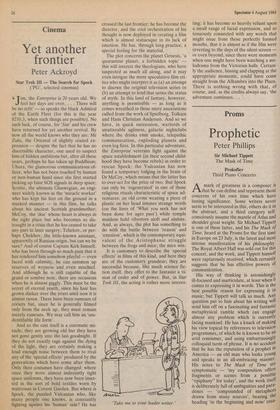Cinema
Yet another frontier
Peter Ackroyd
Star Trek III — The Search for Spock ('PG', selected cinemas)
4 Tim, the Enterprise is 20 years old. We J feel her days are over. . . . There will be no refit' — so speaks the black Admiral of the Earth Fleet (for this is the year 8210.3, when such things are possible). No such luck, of course, for 'Jim' and his crew have returned for yet another revival. By now all the world knows who they are: Mr Zulu, the Oriental of slightly crazed ex- pression — despite the fact that he has no discernible character, one used to suspect him of hidden ambitions but, after all these years, perhaps he has taken up Buddhism; Uhura, the glamorous communications of- ficer, who has not been touched by human or non-human hand since she first started picking up faint SOS signals in deep space; Scottie, the ultimate Glaswegian, an engi- neer widely known as the 'miracle worker' who has kept his feet on the ground in a marked manner — in this film, he talks about his ancient Scottish grandmother; McCoy, the 'doe' whose heart is always in the right place but who becomes so dis- traught in a crisis that he has ceased to take any part in laser surgery; Tchekov, or per- haps Chekhov, the little-known assistant, apparently of Russian origin, but can we be sure? And of course Captain Kirk himself, who has been through so much pain that it has rendered him somehow playful — even faced with calamity, he can summon up reserves of wryness and even mischief. And although he is still capable of the grand or sombre note, there are occasions when he is almost giggly. This must be the secret of eternal youth, since his hair has grown darker over the years until now it is almost raven. There have been rumours of corsets but, since he is generally filmed only from the neck up, they must remain merely rumours. We may call him an 'uni- dentifiable life form'.
And so the cast itself is a cinematic mi- racle; they are growing old but they have not gone gently into the last goodnight. If they do not exactly rage against the dying of the light, they are certainly making a loud enough noise between them to rival any of the 'special effects' produced by the generations which have come after them. Only their costumes have changed: where once they wore almost indecently tight space uniforms, they have now been inser- ted in the sort of bold textiles worn by waitresses in Covent Garden. But where is Spock, the puzzled Vulcanian who, like many people one knows, is constantly fighting against his 'human' side? He has crossed the last frontier: he has become the director, and the cool orchestration of his thought is now deployed in creating a film which is almost statuesque in its lack of emotion. He has, through long practice, a special feeling for the material.
The plot concerns the planet Genesis, 'a quarantine planet, a forbidden topic' this will interest the theologians, who have suspected as much all along, and it may even intrigue the more speculative film cri- tics who might interpret it as (a) an attempt to disown the original television series or (b) an attempt to lend that series the status of myth. In this land of fantasy, however, anything is permissible — as long as it comes wreathed in those misty associations culled from the work of Spielberg, Tolkien and Hans Christian Andersen. And so we have, in quick succession, warlords of unutterable ugliness, galactic nightclubs where the drinks emit smoke, telepathic communication, exploding planets and even log fires. In this particular adventure, the Enterprise veterans fight against the space establishment (in their second child- hood they have become rebels) in order to rescue Spock: the Vulcanian has now found a temporary lodging in the brain of Dr McCoy, which means that the latter has to over-act for the price of two. But Spock can only be 'regenerated' in one of those religious rituals characteristic of space ad- ventures: an old crone wearing a piece of plastic on her head intones strange words (on the lines of 'What you seek has not been done for ages past') while temple maidens hold vibrators aloft and ululate. And, as always, the plot has something to do with the battle between 'reason' and 'emotion', which is the contemporary equi- valent of the Aristophanic struggle between the frogs and mice; the mice win.
It is customary to describe the 'special effects' in films of this kind, and here they are of the customary grandeur; they are successful because, like much science fic- tion itself, they offer to the fantasist a vi- sion of order and of power. But, in Star Trek III, the acting is rather more interes- 'Take me to your leader writer.'
ting: it has become so heavily reliant upon a small range of facial expression, and so tenuously connected with any words that might issue from those perfectly formed mouths, that it is almost as if the film were reverting to the days of the silent screen or even beyond, since there were moments when one might have been watching a me- lodrama from the Victorian halls. Certain- ly the audience, hissing and clapping at the appropriate moments, could have come straight from the Alhambra into the Plaza. There is nothing wrong with that, of course, and, as the credits always say, 'the adventure continues. . .






































 Previous page
Previous page